rugby punt
[Guh. Google image search for "rugby punt" and one of the first images is Zoltan making his very bad decision against Michigan State. Thanks for nothing, BWS.]
Rugby punt responses.
Yo Brian,
What do you think about having an up man for punt returns when we play against a rugby style punter? How many times have we seen 25 - 30 yard punts turn into 50 yard net results because it was impossible for one man to cover enough ground to catch the ball. If we had an up man he could immediately start moving toward the side that the punter runs toward and would be in position to fair catch many of these 30 yard floaters. I actually like a two man return set up for all punts but it certainly seems to make sense against the rugby style. My nomination for up man is Drew Dileo - great hands, dependable and seems to have an unflappable field presence.
All the best,
Jerry in Ibiza
Against traditional punts putting a second guy that far back could be an invitation for the opponent to run a fake. You could get away with it for a few games but once opponents plan for 9-on-11 you're asking for trouble.
That problem doesn't exist with spread punting*. Fakes there are invariably the punter taking off after he sees the opponent bug out downfield, something the returning team can prevent with three or four guys. So… yeah, I've been in favor of a second returner for a while now. The combo of spread with rugby style punting means returns are infrequent and the best you can hope for is to field the thing on the fly and hope to get lucky—having a guy a closer to the roll side who's 30 yards deep could save you dozens of yards of field position.
In the last year of the Rodriguez regime we actually saw something like that in the open practice. Michigan came out with three returners, one at normal depth in the middle of the field and two guys outside of him closer to the line of scrimmage. Never actually saw it in a game, though, and the punting was so terrible in that practice that we never even saw it return in practice.
I doubt Michigan ever does something like this—using the old-style punting is indicative of a regime that's not particularly innovative on special teams.
*[Rugby punt googling also turns up a coaching video on the thing calling it "shield" punting and enumerating its many advantages:
The traditional punt formation has only two gunners. Everyone else is tasked with protecting the punter until the kick is off, which means they lose time they could be using to go after the returner. The basic shield punt formation allows for much better coverage by spreading out seven gunners on the line of scrimmage with three defenders protecting the punter.
The shield punt is a simple formation that results in your opponents giving you fewer looks and allows you to minimize practice time spent on punt coverage. Your athletes have limited assignments which translates into quick learning and fewer reps in practice.
Seven gunners, man.
BONUS RANDOM Australian team logo:
Is that a location or a description? ]
One of about a dozen emails about why we couldn't do anything against MSU.
Brian,
Denard, Borges, and the o-line are rightfully getting a lot of heat after Saturday's loss. How much of the blame should go on the wide receivers? MSU loaded up the box and dared UM to beat them through the air. They manned up on the wide-outs and sent the house. I remember a few plays Denard missed open guys, but on most passes the receivers were blanketed. On one pass over the middle, Denard stepped up into the pocket and threw a bullet to Roundtree. The pass was slightly to Roy's left, but instead of sliding his feet, he just reached for it, and the ball glanced off his hands. The best way to stop a team from blitzing is to beat man coverage. On the Roundtree TD, it took a near perfect throw to fit the ball in there.
Clearly MSU didn't respect our wide-outs' ability to beat man coverage. This is the first game I think we missed Stonum's speed. He had that huge catch and run to jump start the team 2 years ago against State. He also got the offense over the hump last year vs. (gulp) UMass. Hemingway is a good position guy, crafty after the catch, great on jump balls, but he's no burner. What impact do you think Stonum might have had on Saturday's game?
Thanks, Mike
PS - why no more bubbles? On the Denard pick 6, UM had 3(!) on 2 and didn't throw it. I don't think we're stretching the field enough horizontally anymore.
I have many of these arguing that various things were wrong with the offense, so if this isn't yours, apologies for not replying—I did read it and will go into UFR looking for it.
As for the wideouts, it seemed like the wind was also screwing with them. Michigan State suffered a half-dozen drops to go with Roundtree's. That's more evidence passing was not the best idea on Saturday.
Did they get open and if not was that their fault? It's hard to tell. While the WRs weren't open on that disastrous three-play sequence in the second quarter, other players were. If the QBs throw to the hand-wavingly wide open guys we're not having this conversation. On other plays they may not have been open because Michigan ran three guys deep into cover three. There was a shocking lack of short routes to exploit MSU's constant double-A-gap blitzing.
Just last week the WRs brought in seven iffy passes from the QBs against Northwestern, and while they aren't Edwards, Avant, and Breaston issuing those guys the blame when they hardly got a hand on the ball is goofy. The QBs and Borges were the main issues.
RE: bubbles. I don't know, man. Argh. They looked open all day. That's a symptom of a larger issue: lack of constraints in general. The base didn't do anything in large part because MSU was cheating it and Michigan had nothing to punish the cheating. It's possible they did but couldn't execute it—Meyer thought the pick six was a slant that a WR did not run.
Ticket wait list: not so good.
So I decided after many years to get my own tickets, expecting to go on a waitlist for end zone seats, maybe take a couple years or more for my name to come up.
I read the online info and sent an email to the ath dept to clarify.
To sum up what I learned, I'm told that I have the opportunity to make a donation of $500 to be on the interest list for this year. Key points: 500 minimum donation, but no guarantee of getting tickets. $500 puts me on the list for this year only. If I don't get them this year, then I need to cough up another $500 to try again next year. Or just donate a large enough amount move higher up the list. It's all about points. More points move you up the list. My degree is worth 5 points, which I could buy for a mere $500.
I told them to tell pass along my dislike to DB.
Steve
This is bizarre given the many stories floating around on the internet stating that over the past half-dozen years or so you could jump the season ticket wait list with a donation of $100, $150 at worst. To reiterate, this is next year's home schedule: Air Force, UMass, Illinois, MSU, Northwestern, and Iowa. You could pay $500 for the privilege of being on the wait list, or you could take your 500 bucks, scalp every game, and have enough for a Wii left over.
I'll be fascinated to see how this works.
Ideal offenses.
Hey Brian,
Since there has been much criticism and analysis of the various systems deployed by current and former coaches, I am just curious: what is your ideal offense? As in, if you were to become an offensive coordinator, what would the personnel look like and which current system would it most resemble?
Thanks,
QVIST
Oregon. Oregon has the whole toolbox: power, inside zone, outside zone, constraints on all of those, the zone read, and a downfield passing game that is often a blitheringly open touchdown factory. There are a number of other systems that I wouldn't mind—I like Oklahoma's "have an NFL first round QB throwing to NFL first round wideouts" strategy—but the tiebreaker for me is Oregon's ability to manipulate the tempo of the game in their favor.
Oregon can play lightning fast when they have the opponent off balance, which keeps the opponent off balance. If they were to hypothetically be behind in a game, the up tempo nature of the system helps them there, too. If you're trying to kill a game it's nice to have a rushing attack well over seven yards a carry. And finally being really good and playing fast makes you less vulnerable to weird stuff because you're putting more possessions in the game.
Oklahoma's air-raid derived passing spread is also quite lovely but seems more vulnerable to vagaries in quarterback talent. Oregon made Jeremiah Masoli an all-conference player.
We will make an exception this time.
Brian,
I graduated from UM Law in 2006 and consider myself to be a huge Michigan fan. I went to Yale as an undergrad and was in an a capella singing group (I know, I know) called the Baker's Dozen. Through some weird circumstances, I found out last year that from the early '60s until the late '80s, my group sang and recorded "Hawaiian War Chant."
As you would imagine, or, I would hope, can at least understand, I freaked out and immediately found and purchased a copy of an album from the 80s that contained the song. In the meantime, an alum of the group sent me the attached mp3 which is a recording from the Baker's Dozen's 1960 album.
My wife's about to have twins, so I figure the only logical thing to do is to send the girl to Michigan and the boy to Yale where he'll join the same group and revive the song. That's not a weird plan, right?
Go Blue.
Tyler Mann
Here is one without the other:
Someone in the readership will no doubt find a 60s a capella version of Temptation now. This is what the readership does. It is a machine.
Previously in this series: ESPN Images, Michigan's offense, and Michigan's defense.
This one goes to 11 despite my intention to make it a top ten list because I wrote them up piecemeal and at some point after too much effort had been put into each to throw any away I realized I had an extra item. This is obviously fate, so here they are.
These are ranked by gut because you can't put a number on the special sort of misery football can inflict. How to rate high on thie list:
- Represent a major missed opportunity. Games from the Year of Infinite Pain do feature prominently but towards the end of the list because reversing any one of them means you went 8-4, which BFD.
- Be an easily preventable error. Sometimes bad stuff happens. Sometimes you do it to yourself.
- Be the obvious start of something terrible; some individual plays on the list were moments when it became clear a large number of plays later were going to be very bad.
And now on with the hairshirts!
11. Unblocking That Field Goal
Dusty Magnum lines up for a 38 yard field goal on the last play of the 2005 Rose Bowl. Michigan charges hell-bent after the kick and gets two players in position to block the thing, but the ball manages to split Ernest Shazor's arms, taking a deflection off his elbow. The slightly redirected ball squeezes through Prescott Burgess's hands and through the uprights. Michigan loses 38-37.
The event:
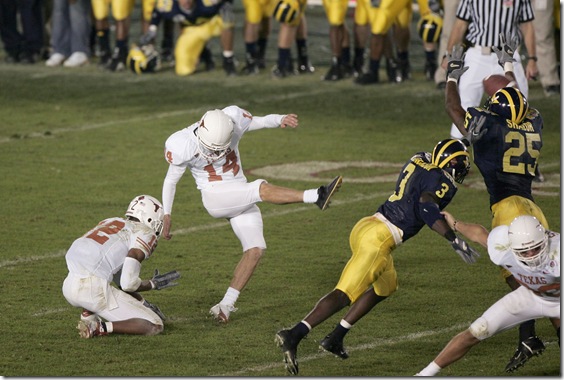
The aftermath:
A lot of these moments to come are going to be events that cost Michigan some opportunity in the future. This one was simple: if Shazor's dive takes him an inch to the left or right, Michigan wins one of the classic Rose Bowls of all time and I don't spend a couple hours making "The Five Stages of Vince Young" in a South Park character generator.
Despite that, the play is mostly notable for how close Michigan came to doing something that is hard to do, does not involve a Michigan player or coach making a terrible decision*, and did come at the end of a classic someone had to lose. I don't know… it just doesn't rate compared to the rest of the stuff enclosed herein. Losing a close Rose Bowl is hardly the worst thing that's happened to Michigan in the last ten years.
*(Michigan did not attempt to save itself any time in case the field goal was good but Mangum was somewhat shaky and Vince Young was unstoppable the whole night; if Texas was willing to take a 38-yarder I would have been happy enough to let them if I was coaching.)
Late in the 2005 Minnesota game, Jim Herrmann lines up LB Prescott Burgess as a DE opposite the Gopher right tackle. With face-crushing tight end Matt Spaeth also to that side of the field, a 230 pound linebacker who's never played DE is one-on-two versus the best run-blocking line in the conference. Herrmann's playcall is a blitz from the other side of the field that sucks the safety on Burgess's side back into a centerfield position, and a simple off-tackle run goes for 60 yards, allowing Minnesota to kick a game-winning field goal.
Unquestionably the dumbest single playcall any Michigan coach made during the last decade. Michigan was tied with Minnesota 20-20 when Lamarr Woodley decapitated Gopher quarterback Brian Cupito. Minnesota ran a couple times with the backup quarterback, punted, and got the ball back after Michigan's drive stalled out. Stuck around their own 20 with around three minutes on the clock, Minnesota runs twice more, petrified of letting backup and redshirt freshman Tony Mortenson do anything other than hand off.
Mortenson's career numbers: 14 of 39 for 179 yards, 1 TD, 3 INTs. At the time his most extensive run had come in an 0 of 4 performance against Florida Atlantic. Since Cupito has gone out Minnesota has run six straight times. It's third and ten. Minnesota is clearly playing for overtime and will just run it off tackle and punt. An injury to Willis Barringer has forced true freshman Brandon Harrison into the free safety spot, where he pairs with true freshman Jamar Adams.
Jim Herrmann decides to put Burgess in as a down lineman in a nickel package, lines him up on the strong side of the formation, and blitzes away from Burgess. The rest is Gopher history:
Burgess ended up ten yards downfield and still couldn't get off his block, but that was not exactly his fault.
In the long run this did not matter since Michigan stumbled to 7-5 in and though they could have easily won three more games, this one included, they could easily have lost three more. Herrmann would be shipped off to the NFL after the season, clearing the way for Ron English to give everyone the wrong idea for ten games. Speaking of Jim Herrmann's failings during 2005…
9. Carr punts from the Ohio State 34
Leading 21-19 in the dying minutes of the 2005 Game, Michigan has a first down on the Ohio State side of the field. Two runs to bleed OSU's timeouts get nowhere. They're followed by a six-yard WR screen that uses the last OSU timeout. On fourth and four from the OSU 34, Carr brings out his kicker to do the fake-kick-actually-punt thing, which goes out of bounds at the OSU 12.
Of all the awful math-spurning things I ever saw Lloyd Carr do this was the worst. Ways in which it was a terrible idea:
- The clock was hovering around three minutes and OSU had no timeouts. If you get the first down the game is essentially over. If you give the ball back OSU is not under any serious time pressure. Indeed, they scored and Michigan had 20 or so seconds to respond.
- Michigan's defense had crumbled on three separate score-or-die drives earlier in the year, four if you count the one Michigan had ceded to OSU just moments ago. On each they had played soft, ensuring that when the opponent scored Michigan would have no opportunity to respond.
- OSU was down two points and only needed a field goal.
- The fake field goal punt was so obviously coming that OSU put a returner back. If the punt had been slightly better that guy was off to the races.
- You spurned the opportunity to get a first down on third down for a more makeable fourth down so you could take away OSU's meaningless final time out.
Instead of taking a solid shot at ending the game, Carr chose 22 yards of field position that Michigan gave back in three plays by playing soft. I shorted out in the aftermath. Under pressure Carr reverted to the sort of call that hadn't been right since 1979 and it cost Michigan its best shot to put a dent in this agonizing OSU winning streak.
8. Pitch it to Breaston!
Michigan's attempt to replicate The Play is 15 yards from working when Tyler Ecker runs directly into a Nebraska defender on the sideline instead of pitching the ball to Steve Breaston, a man with a plan in the open field. Panama.
We end our Year of Infinite Pain trifecta with this:
I actually ended up at a tailgate that Tyler Ecker was at once, and all I could think was "why didn't you pitch it?"
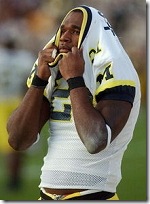 7. Rugby punt fiasco dénouement
7. Rugby punt fiasco dénouement
Michigan was really, really good in 2003. John Navarre had molted from an inept flamingo into a laser-chucking flamingo. Chris Perry made one of those senior-year explosions you always hope will happen but almost never does. Braylon Edwards announced his presence. The defense featured Marlin Jackson, Ernest Shazor before he went up in smoke, Pierre Woods before he went up in smoke, and Lawrence Reid before his back imploded. (Unsurprisingly, the yardage defense would sag from 11th to 33rd the following year.) They were good.
But it all blew up on special teams. A grad assistant named Jim Boccher was placed in charge of it; by the end of the year he'd be in real estate and (probably) therapy. Things first went poorly against Oregon. Oregon blocked an Adam Finley punt for a touchdown. A fake punt attempt ended in a fumble. Oregon returned a punt for a touchdown. Despite getting a special teams touchdown of its own on a blocked chip-shot field goal, Michigan gave away ten points on special teams in a four-point loss.
That could have been random fortune, but what happened against Iowa was not. Boccher was an eager beaver who was actually ahead of the rugby punt curve that has spread through college football; stodgy Michigan was one of the first teams to try this high school thing out. The announcers openly wondered what the heck was going on. The intervening years have proven that it's a good idea if you can do it right.
Michigan could not, and was immediately reminded of why it liked being stodgy. Iowa almost blocked a punt, then almost blocked another one, then deflected a third; Michigan was fortunate that the deflection was partial. Along the way Michigan had given up a 43-yard punt return to Ramon Ochoa that set up a nine-yard Hawkeye touchdown drive. When Rivas wandered out with five minutes left in the third quarter, the whole stadium could feel it coming, and it did: Iowa finally returned one to sender, setting up a one-yard field goal drive. Michigan lost by three despite outgaining Iowa 463-295.
Boccher sought other opportunities before Michigan fans had the opportunity to seek him; the 2003 team would go undefeated outside of games in which their special teams cost them at least ten points until meeting USC in the Rose Bowl. That was the year in which USC got booted from the title game despite being #1 in both polls; if Michigan's special teams hadn't imploded so spectacularly an undefeated Michigan would have featured in the national title game against an Oklahoma team that had just blown the Big 12 title against Kansas State; Kansas State got blown out by an OSU team that Michigan had just handled. Competency on special teams could have resulted in a national title.
Tomorrow: The top six. Wear a cup.
![punt[1] punt[1]](https://mgoblog.com/sites/mgoblog.com/files/punt1_thumb.jpg)
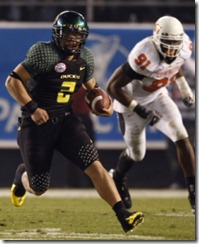
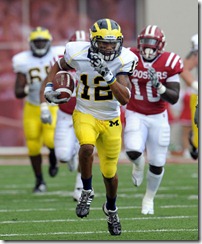
![sea-eagles-logo[1] sea-eagles-logo[1]](https://mgoblog.com/sites/mgoblog.com/files/sea-eagles-logo1_thumb.jpg)
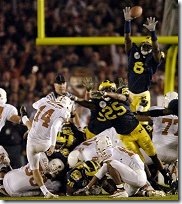
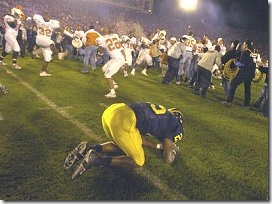
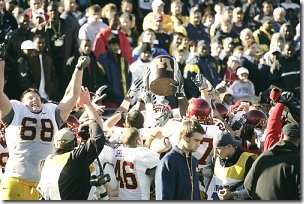
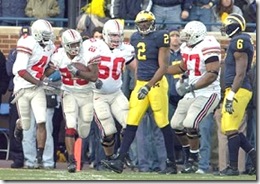
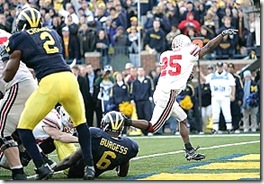
63